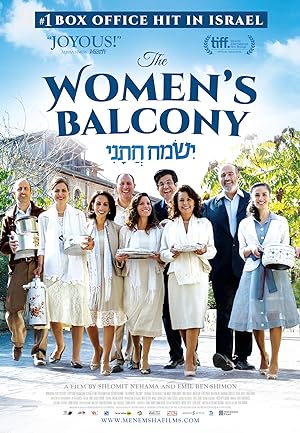If you would boycott Wonder Woman because the star is from Israel, then don’t read any further because The Women’s Balcony is not for you. I have stumbled upon a new genre of films, the Orthodox Jewish dramedy, which is family friendly and shot in Israel. This film is about a joyous Orthodox community that suffers an accident, which threatens to tear apart the congregation. Unlike Christian films in the US, this film appears to be popular and critically acclaimed in Israel.
If The Women’s Balcony is emblematic of the Orthodox Jewish dramedy, its primary goal is a happy marriage in which men and women are always together. Anything that threatens that happiness is the villain even if it seems holy or devoted to God. When the women protest, they are happy to interrupt their agenda if it means encouraging a young woman to pursue a relationship with a young man who may not approve of them. This nascent relationship is the litmus test for who is really devout and who is misguided. It is not just an afterthought subplot to the broader drama.
The Women’s Balcony suggests that misogyny is dangerous because anything that keeps husbands and wives from communicating is not of God. By creating external strains on a marriage, separating them at the most holy times or encouraging men to deceive their wives, it sows discord. The film has no problem with putting women on a pedestal as long as the men are constantly looking up and following their wives’ leads. If someone tells you that women are holy like scrolls then shove them in the street, be suspicious.
The Women’s Balcony’s opening scene is the ideal. Men and women eagerly run through the streets together as a community to worship God. When the rabbi and his wife are separated by circumstance, it wreaks havoc on the entire community, and things get dark pretty rapidly: forgery, stealing, manipulating a sick old man, condemning women as a threat to the nation. There is an unofficial network of religious spies watching neighbors to see whom one should or should not associate with. Even though the one that creates this conflict says that women are innately closer to God, he does not heed the consequences of those words by respecting the women’s voice in the community. There is one scene where a woman tells a young man about the proper way to pray to God: not to get what you want, but just appreciate the opportunity to exist and love him. The relationship between the husbands and wives is supposed to be parallel.
Even though I enjoyed The Women’s Balcony, a lot got lost in translation because of the language, cultural, national and religious differences. For example, I got stuck on the whole minyan thing-why not pray with the people that you have? Also I clutched my pearls when a character said that you must never say that a rabbi is wrong. So I could never be a Catholic or an Orthodox Jew. Got it! Also if I have to serve in the military, and you take my money without spending it on me, you would not get a warning. If you don’t like women, then you shouldn’t like our money.
If you do decide to watch The Women’s Balcony, I would encourage you to focus on all the women. Even though some women are more prominent than others, some supporting characters play a more pivotal role than I expected, and I would have focused on them more if I thought they were going to be crucial to the plot. There are subtitles so if that dissuades you, run. I enjoyed the film, but would not call it a must see film. Side note: all the women had amazing hair.
Stay In The Know
Join my mailing list to get updates about recent reviews, upcoming speaking engagements, and film news.





